Leadership and Management: Theories, Roles, and Functions Report
VerifiedAdded on 2023/02/02
|6
|1354
|65
Report
AI Summary
This report delves into the crucial aspects of leadership and management, comparing the roles and characteristics of leaders and managers. It highlights the differences in their problem-solving approaches, risk-taking behaviors, communication styles, and overall aims within an organization. The r...
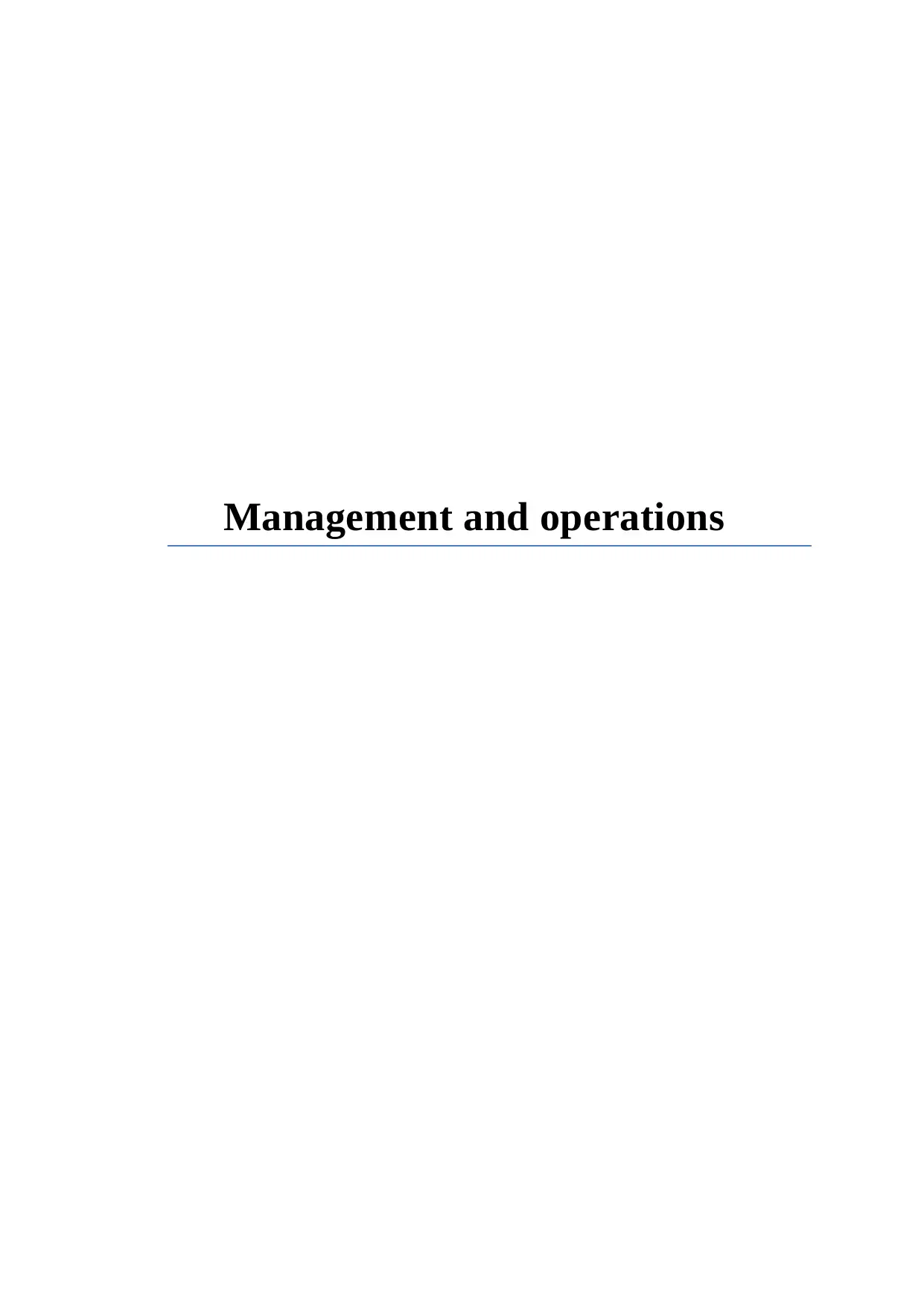
Management and operations
Paraphrase This Document
Need a fresh take? Get an instant paraphrase of this document with our AI Paraphraser
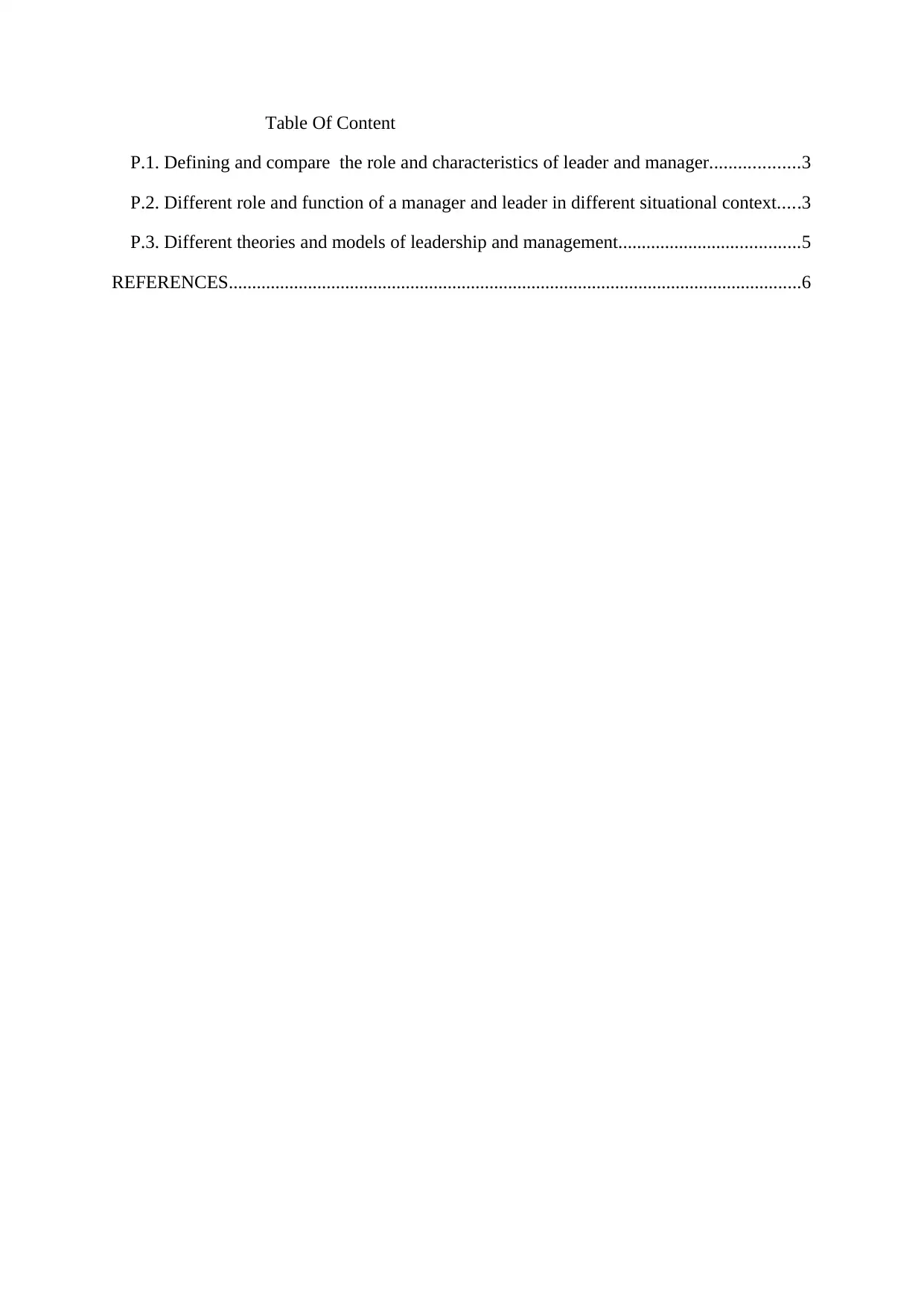
Table Of Content
P.1. Defining and compare the role and characteristics of leader and manager...................3
P.2. Different role and function of a manager and leader in different situational context.....3
P.3. Different theories and models of leadership and management.......................................5
REFERENCES...........................................................................................................................6
P.1. Defining and compare the role and characteristics of leader and manager...................3
P.2. Different role and function of a manager and leader in different situational context.....3
P.3. Different theories and models of leadership and management.......................................5
REFERENCES...........................................................................................................................6
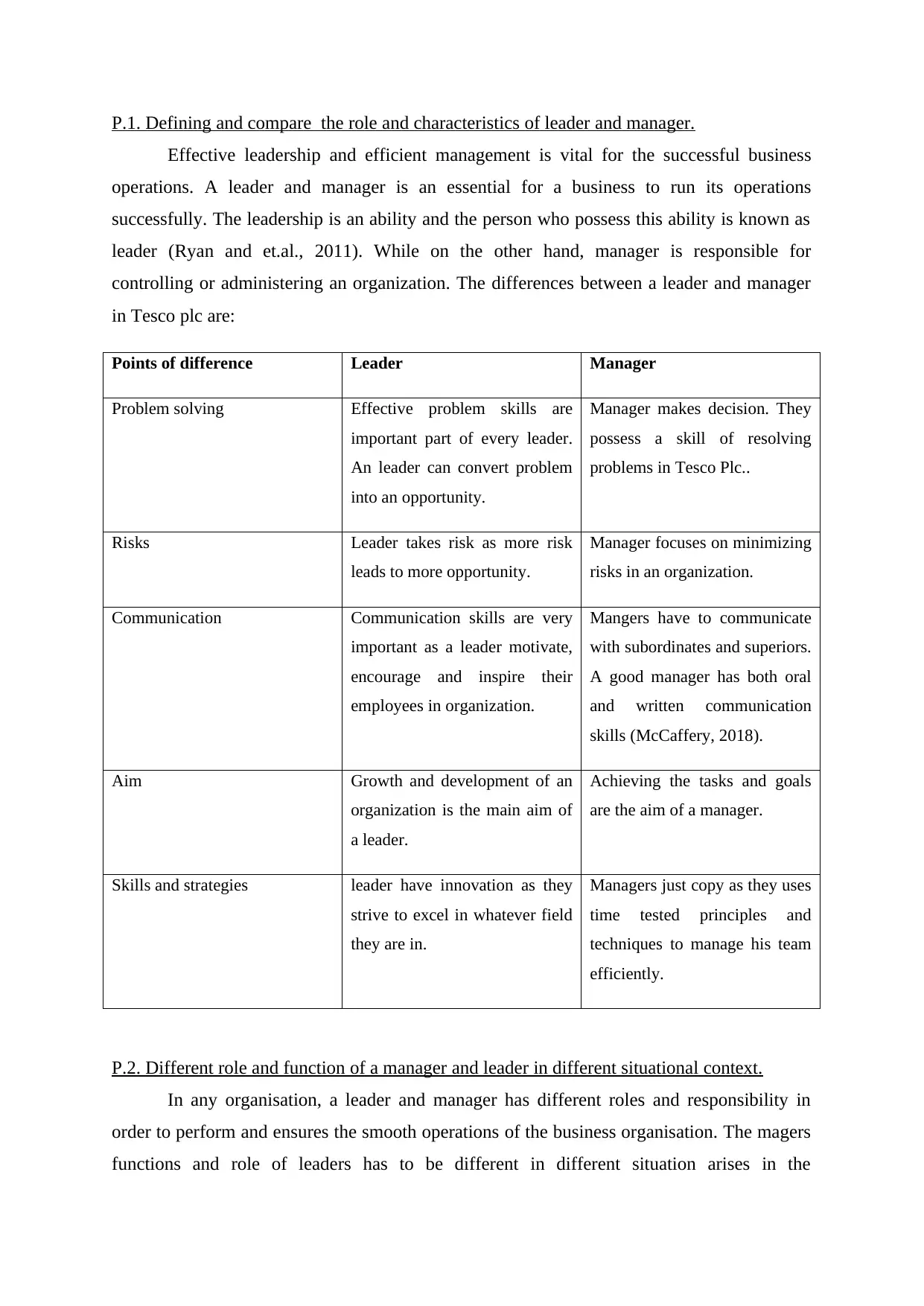
P.1. Defining and compare the role and characteristics of leader and manager.
Effective leadership and efficient management is vital for the successful business
operations. A leader and manager is an essential for a business to run its operations
successfully. The leadership is an ability and the person who possess this ability is known as
leader (Ryan and et.al., 2011). While on the other hand, manager is responsible for
controlling or administering an organization. The differences between a leader and manager
in Tesco plc are:
Points of difference Leader Manager
Problem solving Effective problem skills are
important part of every leader.
An leader can convert problem
into an opportunity.
Manager makes decision. They
possess a skill of resolving
problems in Tesco Plc..
Risks Leader takes risk as more risk
leads to more opportunity.
Manager focuses on minimizing
risks in an organization.
Communication Communication skills are very
important as a leader motivate,
encourage and inspire their
employees in organization.
Mangers have to communicate
with subordinates and superiors.
A good manager has both oral
and written communication
skills (McCaffery, 2018).
Aim Growth and development of an
organization is the main aim of
a leader.
Achieving the tasks and goals
are the aim of a manager.
Skills and strategies leader have innovation as they
strive to excel in whatever field
they are in.
Managers just copy as they uses
time tested principles and
techniques to manage his team
efficiently.
P.2. Different role and function of a manager and leader in different situational context.
In any organisation, a leader and manager has different roles and responsibility in
order to perform and ensures the smooth operations of the business organisation. The magers
functions and role of leaders has to be different in different situation arises in the
Effective leadership and efficient management is vital for the successful business
operations. A leader and manager is an essential for a business to run its operations
successfully. The leadership is an ability and the person who possess this ability is known as
leader (Ryan and et.al., 2011). While on the other hand, manager is responsible for
controlling or administering an organization. The differences between a leader and manager
in Tesco plc are:
Points of difference Leader Manager
Problem solving Effective problem skills are
important part of every leader.
An leader can convert problem
into an opportunity.
Manager makes decision. They
possess a skill of resolving
problems in Tesco Plc..
Risks Leader takes risk as more risk
leads to more opportunity.
Manager focuses on minimizing
risks in an organization.
Communication Communication skills are very
important as a leader motivate,
encourage and inspire their
employees in organization.
Mangers have to communicate
with subordinates and superiors.
A good manager has both oral
and written communication
skills (McCaffery, 2018).
Aim Growth and development of an
organization is the main aim of
a leader.
Achieving the tasks and goals
are the aim of a manager.
Skills and strategies leader have innovation as they
strive to excel in whatever field
they are in.
Managers just copy as they uses
time tested principles and
techniques to manage his team
efficiently.
P.2. Different role and function of a manager and leader in different situational context.
In any organisation, a leader and manager has different roles and responsibility in
order to perform and ensures the smooth operations of the business organisation. The magers
functions and role of leaders has to be different in different situation arises in the
⊘ This is a preview!⊘
Do you want full access?
Subscribe today to unlock all pages.

Trusted by 1+ million students worldwide
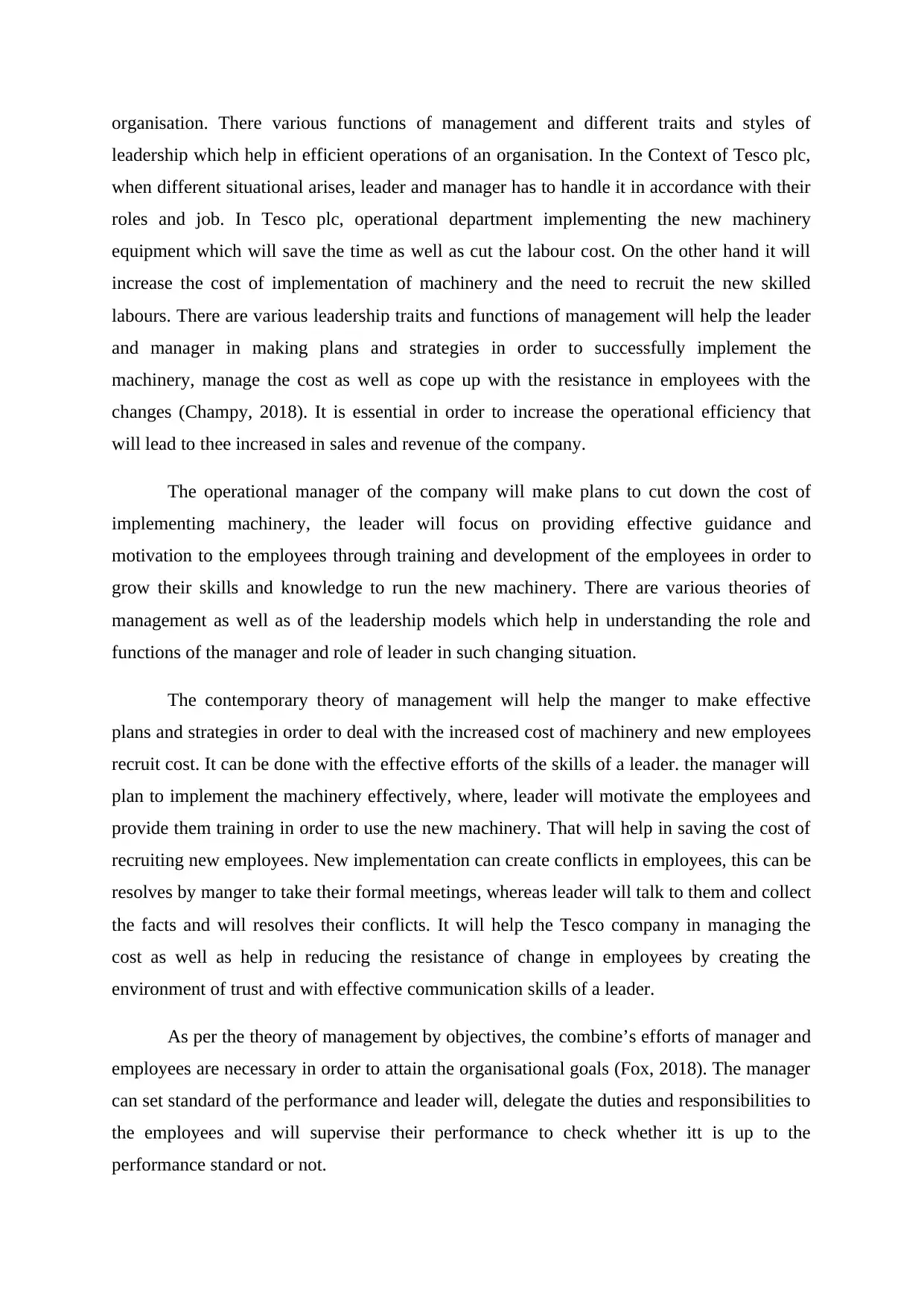
organisation. There various functions of management and different traits and styles of
leadership which help in efficient operations of an organisation. In the Context of Tesco plc,
when different situational arises, leader and manager has to handle it in accordance with their
roles and job. In Tesco plc, operational department implementing the new machinery
equipment which will save the time as well as cut the labour cost. On the other hand it will
increase the cost of implementation of machinery and the need to recruit the new skilled
labours. There are various leadership traits and functions of management will help the leader
and manager in making plans and strategies in order to successfully implement the
machinery, manage the cost as well as cope up with the resistance in employees with the
changes (Champy, 2018). It is essential in order to increase the operational efficiency that
will lead to thee increased in sales and revenue of the company.
The operational manager of the company will make plans to cut down the cost of
implementing machinery, the leader will focus on providing effective guidance and
motivation to the employees through training and development of the employees in order to
grow their skills and knowledge to run the new machinery. There are various theories of
management as well as of the leadership models which help in understanding the role and
functions of the manager and role of leader in such changing situation.
The contemporary theory of management will help the manger to make effective
plans and strategies in order to deal with the increased cost of machinery and new employees
recruit cost. It can be done with the effective efforts of the skills of a leader. the manager will
plan to implement the machinery effectively, where, leader will motivate the employees and
provide them training in order to use the new machinery. That will help in saving the cost of
recruiting new employees. New implementation can create conflicts in employees, this can be
resolves by manger to take their formal meetings, whereas leader will talk to them and collect
the facts and will resolves their conflicts. It will help the Tesco company in managing the
cost as well as help in reducing the resistance of change in employees by creating the
environment of trust and with effective communication skills of a leader.
As per the theory of management by objectives, the combine’s efforts of manager and
employees are necessary in order to attain the organisational goals (Fox, 2018). The manager
can set standard of the performance and leader will, delegate the duties and responsibilities to
the employees and will supervise their performance to check whether itt is up to the
performance standard or not.
leadership which help in efficient operations of an organisation. In the Context of Tesco plc,
when different situational arises, leader and manager has to handle it in accordance with their
roles and job. In Tesco plc, operational department implementing the new machinery
equipment which will save the time as well as cut the labour cost. On the other hand it will
increase the cost of implementation of machinery and the need to recruit the new skilled
labours. There are various leadership traits and functions of management will help the leader
and manager in making plans and strategies in order to successfully implement the
machinery, manage the cost as well as cope up with the resistance in employees with the
changes (Champy, 2018). It is essential in order to increase the operational efficiency that
will lead to thee increased in sales and revenue of the company.
The operational manager of the company will make plans to cut down the cost of
implementing machinery, the leader will focus on providing effective guidance and
motivation to the employees through training and development of the employees in order to
grow their skills and knowledge to run the new machinery. There are various theories of
management as well as of the leadership models which help in understanding the role and
functions of the manager and role of leader in such changing situation.
The contemporary theory of management will help the manger to make effective
plans and strategies in order to deal with the increased cost of machinery and new employees
recruit cost. It can be done with the effective efforts of the skills of a leader. the manager will
plan to implement the machinery effectively, where, leader will motivate the employees and
provide them training in order to use the new machinery. That will help in saving the cost of
recruiting new employees. New implementation can create conflicts in employees, this can be
resolves by manger to take their formal meetings, whereas leader will talk to them and collect
the facts and will resolves their conflicts. It will help the Tesco company in managing the
cost as well as help in reducing the resistance of change in employees by creating the
environment of trust and with effective communication skills of a leader.
As per the theory of management by objectives, the combine’s efforts of manager and
employees are necessary in order to attain the organisational goals (Fox, 2018). The manager
can set standard of the performance and leader will, delegate the duties and responsibilities to
the employees and will supervise their performance to check whether itt is up to the
performance standard or not.
Paraphrase This Document
Need a fresh take? Get an instant paraphrase of this document with our AI Paraphraser
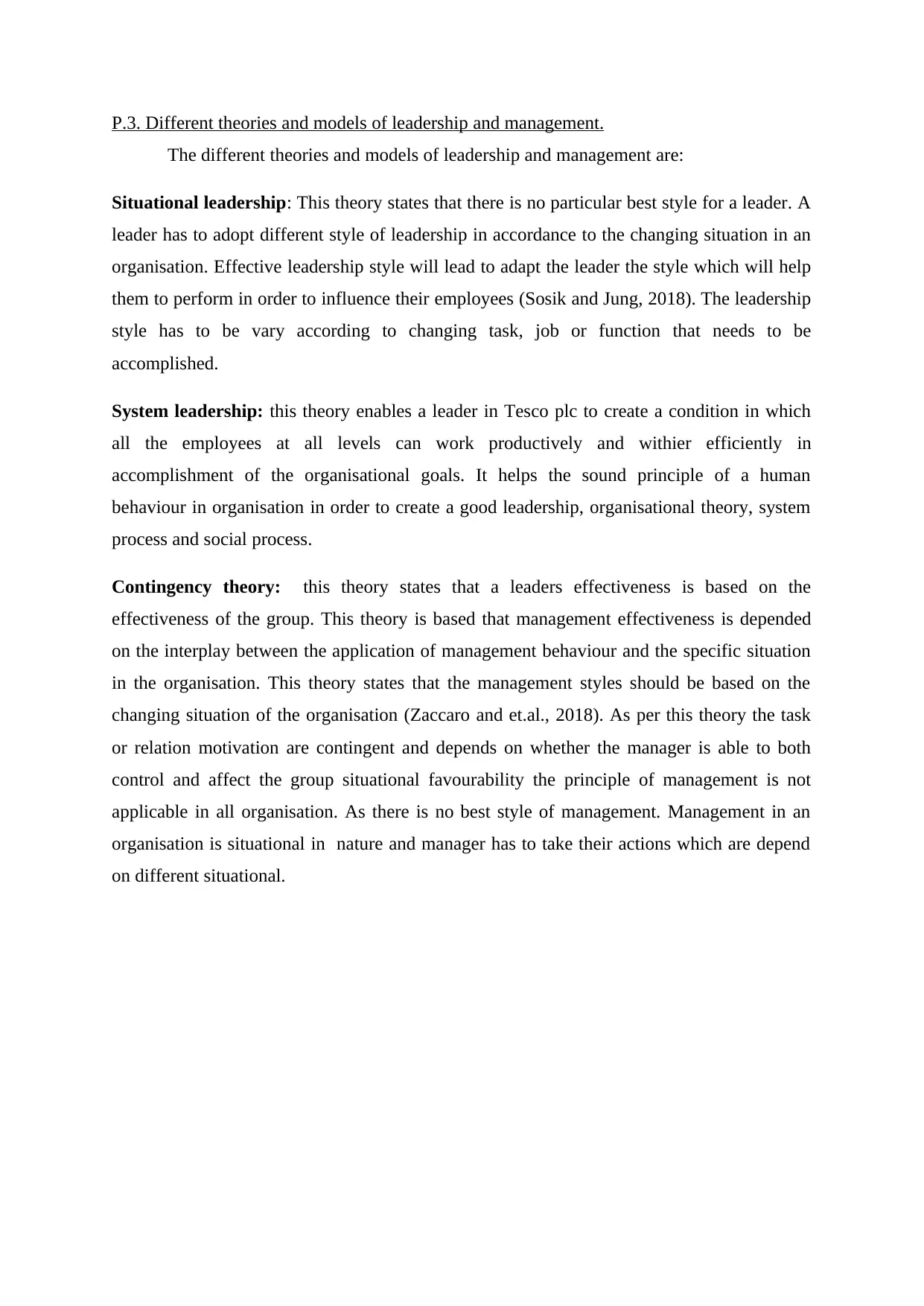
P.3. Different theories and models of leadership and management.
The different theories and models of leadership and management are:
Situational leadership: This theory states that there is no particular best style for a leader. A
leader has to adopt different style of leadership in accordance to the changing situation in an
organisation. Effective leadership style will lead to adapt the leader the style which will help
them to perform in order to influence their employees (Sosik and Jung, 2018). The leadership
style has to be vary according to changing task, job or function that needs to be
accomplished.
System leadership: this theory enables a leader in Tesco plc to create a condition in which
all the employees at all levels can work productively and withier efficiently in
accomplishment of the organisational goals. It helps the sound principle of a human
behaviour in organisation in order to create a good leadership, organisational theory, system
process and social process.
Contingency theory: this theory states that a leaders effectiveness is based on the
effectiveness of the group. This theory is based that management effectiveness is depended
on the interplay between the application of management behaviour and the specific situation
in the organisation. This theory states that the management styles should be based on the
changing situation of the organisation (Zaccaro and et.al., 2018). As per this theory the task
or relation motivation are contingent and depends on whether the manager is able to both
control and affect the group situational favourability the principle of management is not
applicable in all organisation. As there is no best style of management. Management in an
organisation is situational in nature and manager has to take their actions which are depend
on different situational.
The different theories and models of leadership and management are:
Situational leadership: This theory states that there is no particular best style for a leader. A
leader has to adopt different style of leadership in accordance to the changing situation in an
organisation. Effective leadership style will lead to adapt the leader the style which will help
them to perform in order to influence their employees (Sosik and Jung, 2018). The leadership
style has to be vary according to changing task, job or function that needs to be
accomplished.
System leadership: this theory enables a leader in Tesco plc to create a condition in which
all the employees at all levels can work productively and withier efficiently in
accomplishment of the organisational goals. It helps the sound principle of a human
behaviour in organisation in order to create a good leadership, organisational theory, system
process and social process.
Contingency theory: this theory states that a leaders effectiveness is based on the
effectiveness of the group. This theory is based that management effectiveness is depended
on the interplay between the application of management behaviour and the specific situation
in the organisation. This theory states that the management styles should be based on the
changing situation of the organisation (Zaccaro and et.al., 2018). As per this theory the task
or relation motivation are contingent and depends on whether the manager is able to both
control and affect the group situational favourability the principle of management is not
applicable in all organisation. As there is no best style of management. Management in an
organisation is situational in nature and manager has to take their actions which are depend
on different situational.
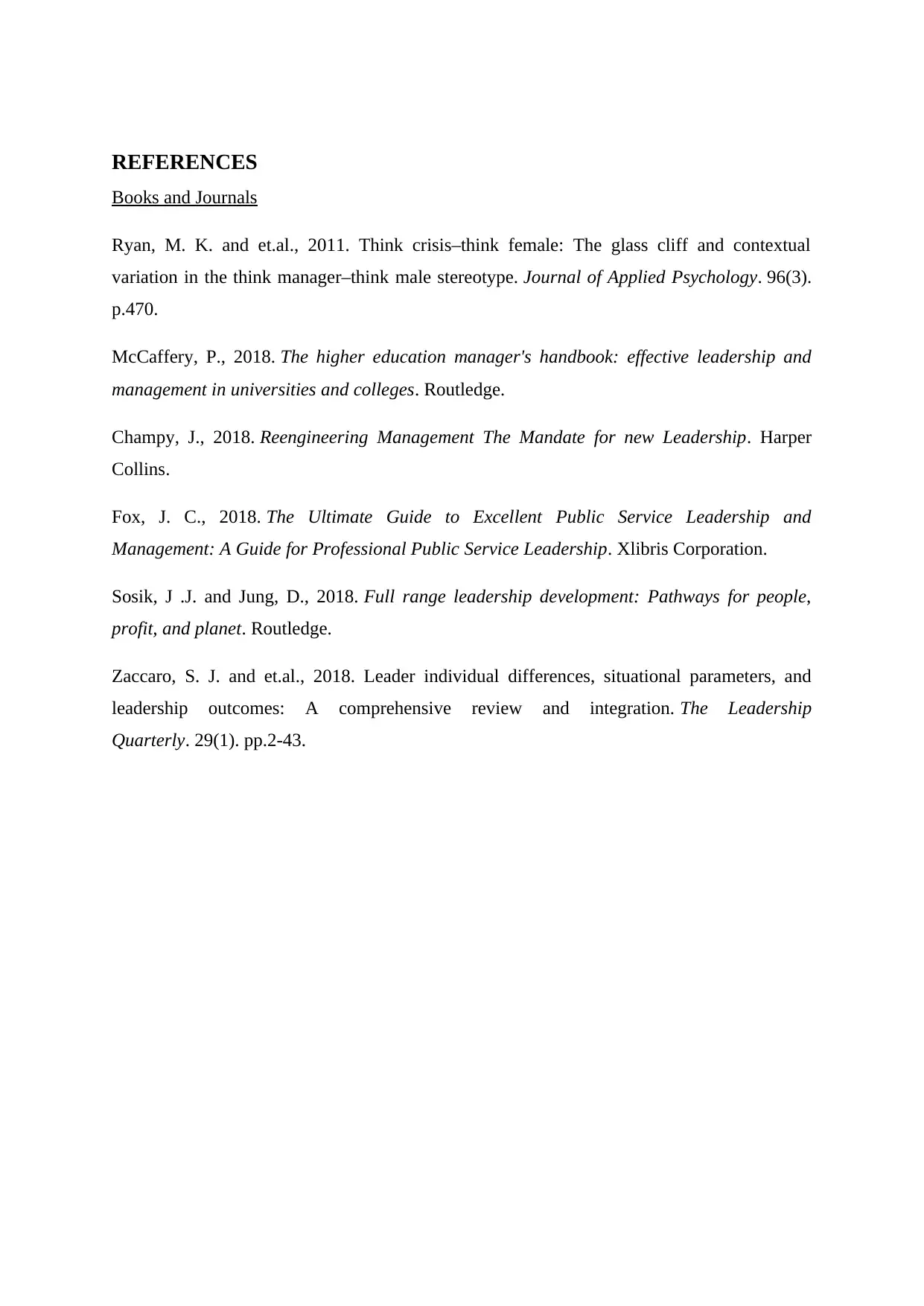
REFERENCES
Books and Journals
Ryan, M. K. and et.al., 2011. Think crisis–think female: The glass cliff and contextual
variation in the think manager–think male stereotype. Journal of Applied Psychology. 96(3).
p.470.
McCaffery, P., 2018. The higher education manager's handbook: effective leadership and
management in universities and colleges. Routledge.
Champy, J., 2018. Reengineering Management The Mandate for new Leadership. Harper
Collins.
Fox, J. C., 2018. The Ultimate Guide to Excellent Public Service Leadership and
Management: A Guide for Professional Public Service Leadership. Xlibris Corporation.
Sosik, J .J. and Jung, D., 2018. Full range leadership development: Pathways for people,
profit, and planet. Routledge.
Zaccaro, S. J. and et.al., 2018. Leader individual differences, situational parameters, and
leadership outcomes: A comprehensive review and integration. The Leadership
Quarterly. 29(1). pp.2-43.
Books and Journals
Ryan, M. K. and et.al., 2011. Think crisis–think female: The glass cliff and contextual
variation in the think manager–think male stereotype. Journal of Applied Psychology. 96(3).
p.470.
McCaffery, P., 2018. The higher education manager's handbook: effective leadership and
management in universities and colleges. Routledge.
Champy, J., 2018. Reengineering Management The Mandate for new Leadership. Harper
Collins.
Fox, J. C., 2018. The Ultimate Guide to Excellent Public Service Leadership and
Management: A Guide for Professional Public Service Leadership. Xlibris Corporation.
Sosik, J .J. and Jung, D., 2018. Full range leadership development: Pathways for people,
profit, and planet. Routledge.
Zaccaro, S. J. and et.al., 2018. Leader individual differences, situational parameters, and
leadership outcomes: A comprehensive review and integration. The Leadership
Quarterly. 29(1). pp.2-43.
⊘ This is a preview!⊘
Do you want full access?
Subscribe today to unlock all pages.

Trusted by 1+ million students worldwide
1 out of 6
Related Documents
Your All-in-One AI-Powered Toolkit for Academic Success.
+13062052269
info@desklib.com
Available 24*7 on WhatsApp / Email
![[object Object]](/_next/static/media/star-bottom.7253800d.svg)
Unlock your academic potential
© 2024 | Zucol Services PVT LTD | All rights reserved.





